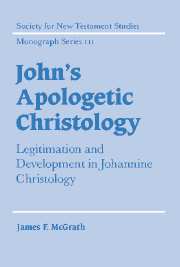Book contents
- Frontmatter
- Contents
- Preface
- Part 1 Introduction
- Part 2 Jesus and God
- 3 Are there ‘two powers’ in John?
- 4 God's equal or God's agent? (John 5)
- 5 ‘I obey, therefore “I am”’ (John 8.12 – 59)
- 6 ‘You are gods’ – but who are ‘you’? (John 10.22 – 39)
- 7 In the bosom of the Father (John 1.1 – 18)
- 8 Conclusion to part 2
- Part 3 Jesus, Moses and Torah
- Part 4 Other issues and conclusion
- 16 Conclusion
- Bibliography
- Index of biblical references
- Index of authors
- Index of subjects
3 - Are there ‘two powers’ in John?
Published online by Cambridge University Press: 22 September 2009
- Frontmatter
- Contents
- Preface
- Part 1 Introduction
- Part 2 Jesus and God
- 3 Are there ‘two powers’ in John?
- 4 God's equal or God's agent? (John 5)
- 5 ‘I obey, therefore “I am”’ (John 8.12 – 59)
- 6 ‘You are gods’ – but who are ‘you’? (John 10.22 – 39)
- 7 In the bosom of the Father (John 1.1 – 18)
- 8 Conclusion to part 2
- Part 3 Jesus, Moses and Torah
- Part 4 Other issues and conclusion
- 16 Conclusion
- Bibliography
- Index of biblical references
- Index of authors
- Index of subjects
Summary
In this second part of the book, we shall be focusing our attention on four key sections of the Gospel of John which concern the relationship between Jesus and God: the prologue and chapters 5, 8 and 10. However, before proceeding to our treatment of this theme, we need to consider one particular issue relating to the Jewish background that is often posited for these Johannine controversy passages. There has been a tendency in recent scholarship to read the Fourth Gospel in light of the evidence in rabbinic literature concerning heretics who claimed that ‘there are two powers in heaven’. This has been a helpful contribution, inasmuch as it has highlighted the fact that Johannine Christianity should be regarded as part of a much wider stream of Jewish thought which later orthodoxy excluded from its definition of Judaism. Alan Segal's study of this topic has shown that the ideas which the later rabbis polemicized against and rejected were probably widespread in first-century Judaism. However, he moves too quickly from the justified conclusion that the ideas were widespread in the New Testament period, to the much more hypothetical conclusion that the ideas were already considered heretical in the first century.
Segal refers to a number of dialogues and discussions in the rabbinic literature which are attributed to tannaitic rabbis, as evidence of the views held during this period. However, there is apparently no passage whatsoever in the Mishnah that Segal could cite as mentioning the ‘two powers’ heresy.
- Type
- Chapter
- Information
- John's Apologetic ChristologyLegitimation and Development in Johannine Christology, pp. 71 - 79Publisher: Cambridge University PressPrint publication year: 2001



